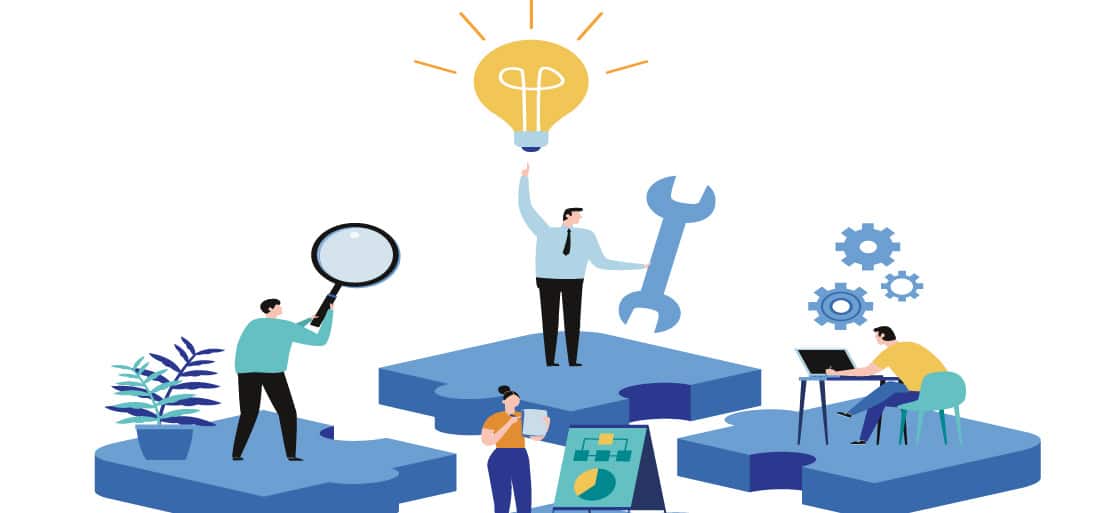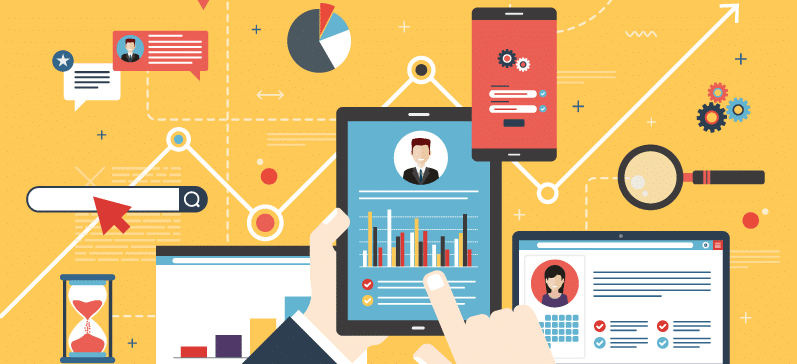As processes and technology evolve, so does the meaning of Project Management. Our modern understanding of Project Management has not always been the predominant definition of the role. In today’s shifting landscape, as collaboration becomes better facilitated by technology, the meaning of Project Management continues to change—traditional responsibilities are being distributed from one or few individuals to more people across the business, enabling more flexibility and adaptability. This decentralized, “all hands-on-deck” model allows teams to deliver projects on time and on budget while taking into account the creativity and nimble decision-making that more complex, comprehensive projects require.
With more people across different roles identifying potential risks, making project-critical decisions, implementing strategy shifts and tracking progress, there is a growing demand for more robust solutions that enable enhanced collaboration as well as opportunities for business users to drive decisions and strategy. Organizations looking to modernize the way they work to better align with this distributed project management model need an enterprise work management solution that centralizes and orchestrates all project related activities across team members and stakeholders.
Evolving Project Management Approaches Require Expansive Solutions
This is where traditional project management solutions often fall short. They have been built to address the more “traditional” hierarchical project management approach and lack the features and functionality needed to hardwire these strategic shifts into the DNA of the team. Organizations looking to implement a work and project management solution that aligns with a distributed project management model should look for a solution that enables next-level collaboration and 360-degree visibility with a composable and adaptable framework that integrates workstyle and process across stakeholders.
Learn how highly adaptable solutions with composable components enable increased scalability and functionality. Download the eBook.
Next-Level Collaboration
To empower more individuals across an organization to contribute to and lead project related activities across the lifecycle of projects, next generation collaboration is key. A team that is aligned from opportunity to delivery reduces risks for costly missteps or slow-downs and improves the profitability of the project. To achieve this synchronization, they need technology that:
- Enables seamless collaboration across teams, time zones and geographies: Remote work and diverse teams only continue to add to the importance of having a solution that functions as a unified, organized homebase, providing up-to-date insights, no matter what role or where (or when) they are working.
- Acts as a collaboration hub and access point: Sharing data and getting real-time views into work across projects, departments, divisions and business units is essential to facilitating successful distributed project management. Without this shared language and knowledge base, “distributed” quickly becomes synonymous with “disorganized.”
- Integrates with and extends leading conversation solutions and chatbots, including Slack: Integrations like these enable enterprise teams to quickly access and share project updates and drive organization-wide performance improvement.
360-Degree Visibility
For greater distribution of project management roles, along with a platform that allows for consistent, powerful collaboration, teams need 360-degree visibility across the entire project lifecycle to anticipate and act on needed shifts, project obstacles or changing business needs. This advanced situational awareness will provide critical insights into potential project risks and profitability, helping business users and teams increase productivity and drive highly informed decisions. Gaining this kind of visibility requires:
- Complete transparency into project plans and activities: Simple, straightforward access to priorities across disparate communities is essential to ensure everyone involved stays on the same pathway to project success.
- Deep analytics and reporting: These critical insights allow for realistic timelines, budget estimates and project delivery plans and enable data-driven risk and profitability projections on future projects.
- Customizable dashboards: Giving stakeholders a streamlined, real-time view of tasks, timelines, performance metrics, resources and financials that are customized to their role empowers more informed decisions along the way helping to push projects forward with improved profitability.
Composable and Adaptable Framework
To successfully implement a distributed project management model, enterprise organizations need a highly adaptable solution that enables increased scalability and functionality across all business users and teams. A truly flexible solution enables organizations to meet their unique needs with ease, reducing time spent on custom solutions and lengthy product development cycles that require large operational teams. A solution of this caliber has:
- Composable components and features: Just like how a distributed project management model can be constructed based on the specific needs of the team and/or project, a useful, impactful solution should be able to morph and fit together in different ways that better meet the needs of a myriad of users and roles.
- A collaborative framework: Growth and scale requires a flexible structure that provides a secure environment for team members across the organization to share project updates, summaries and dashboards with specified security and access depending on their needs.
- Integration capabilities that extend the functionality of leading solutions: Empowering team members to provide expanded capabilities of other proven applications that will help to further facilitate the most complex, customized and multifaceted orders is mission critical. A truly composable and scalable work management solution should enable organizations to easily build on and customize the solution without starting from scratch.
Integration of Workstyles and Process Across Teams
A truly transformative work management solution helps teams grow while maintaining their preferred workstyles and technology cultures. A distributed project management model is all about capturing knowledge, skill, and perspective from a wider segment of the organization to create the best result, which is hard to do if all teams are forced to work in one specific, directed-from-above way. From Kanban, to Lean, to Agile, Gantt and more, distributed teams use different methodologies to be successful, and work and project management solutions shouldn’t force consolidation to a single approach. Technology can support diversity without destroying efficiency by:
- Creating shared pathways: A work and project management platform that supports distribution will allow teams to work the way they work best, communicate with ease and accelerate progress by interconnecting, unifying and adapting all methods, allowing hybrid approaches across projects and departments.
- Providing customizable automations and scripts: Giving access to proven techniques that can be easily built and rearranged allowing users to switch between various methodologies supports team autonomy and promotes diversity of thought and action.
Moving Towards A New Model of Project Management With Leankor
A distributed project management model that puts more influence in the hands of more users is rapidly becoming the new normative pathway to success for enterprises with long and complex project environments. Organizations that are embracing this pathway need adaptable solutions that can shift with business strategies and go beyond basic project management. Comprehensive streamlining of multifaceted projects and tasks being completed across teams and departments with different workstyles is the new standard—and standard project management solutions are struggling to handle it.
Leankor’s collaborative and highly visual work and project management solution goes far beyond traditional project management to enable distributed project management operations and translate large-scale project complexity into stellar outcomes achieved through efficiency and profitability. An orchestrator of large-scale complex projects, it moves beyond basic project management to enable successful distributed project management across the entire project lifecycle in real-time, ensuring that all business users and team members stay in lockstep towards defined goals. Leankor’s cloud-based solution is 100% native to Salesforce, meaning that Salesforce applications like Salesforce Communications Cloud, CPQ, Field Service, Tableau, Einstein AI, Experience Cloud and Slack can be easily unlocked to provide even more insights and scalability. Leankor is highly configurable and composable—its adaptable framework creates a unique and useful experience for each user while providing a consistent, cohesive platform for the entire organization. Teams can retain their specific work styles without breaking down efficiency and collaboration with other parts of the project ecosystem, delivering better project outcomes. This flexibility and respect for users’ creative autonomy means Leankor enables organizations to modernize the way they work and adopt a future-proof work and project management approach.






